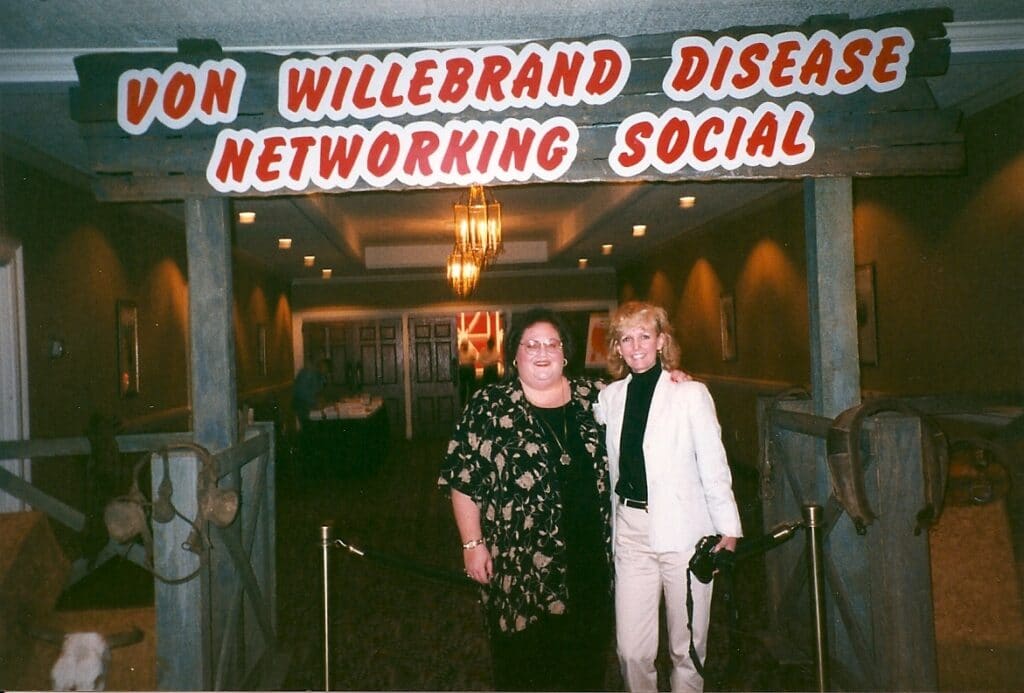What’s in a Name?
I recently saw on Twitter that the Irish Haemophilia Society has decided to use the term disorder when referring to von Willebrand disease. It will now be called von Willebrand disorder. I want to shout hooray! At long last, one organization has seen the light!

Why at long last? Because I’ve been promoting this idea since 2002, when I published the world’s first book on VWD. The excerpt below is from that book, where my co-author Renée Paper and I published our differing opinions on the subject. And not too long ago, a debate erupted on Facebook about what to call VWD. Very heated, very polarized. Tonight I’ll share what I wrote back in 2002. Next week, I’ll publish what Renée, a nurse with VWD, believed.
Excerpted and Adapted from A Guide to Living with to Willebrand Disease, 2002:
For a while, my co-author Renée Paper and I weren’t sure what to title the world’s first book on VWD, published in 2002. We could not agree on what to call VWD—von Willebrand disease, von Willebrand, or break all the rules and call it von Willebrand disorder?

I considered the question as a parent and a person with a degree in child psychology, who had published research on children’s concepts of health and illness in 1979. I questioned using “disease.” Is this what we really want to tell a child? It has long baffled me why the bleeding disorder community refers to hemophilia as a blood disorder but von Willebrand as a disease. Aren’t they both disorders? Can so simple a distinction have an impact on a person’s emotions, thoughts, and even health? In psychology, the meaning that is attached to words matters, especially to a child. I worry for the child who has VWD. To a child, the labels that a parent uses matter a great deal.
To people who work in the medical field, the term disease may not mean anything different than the term disorder. But to a child, disease may carry significant associations that are almost always negative. To a child, disease is usually akin to death—it can mean fatal, degenerative, and contagious.
Think of the impact of telling a child that he or she has von Willebrand disease. How does she view her condition in relation to others? Does he think that he could die of it? Will it get worse? Can others catch it? Calling it a disease, when it could be called a disorder, may provoke unnecessary anxiety, fear, and misunderstanding.
So why don’t we just change the name? I have been told that it’s more important for VWD to remain a disease for now. The bleeding disorder community needs healthcare dollars to educate the public and find those with VWD who remain undiagnosed and suffer in silence. So the community
continues to use a word that generates concern and commands attention. The word disease has impact.
In the end, Renée and I opted to use the conventional term to avoid rocking the political and medical establishments. But as a parent or as a person with VWD, you do not need to follow a political agenda with your child or your family. If you are the parent of a child with VWD, ask your child the difference between disease and disorder and listen what he or she thinks. When you explain diagnosis or treatment to your child, you may want to leave out the word disease and instead say von Willebrand or VWD. Ask your child’s doctors and nurses to do the same. More important than any political agenda and more important than what the medical books say is your child’s self-esteem. What you tell your child about VWD matters a great deal. Be sure it is as positive and empowering as possible.
Next week: Renée’s take on disease vs disorder.

